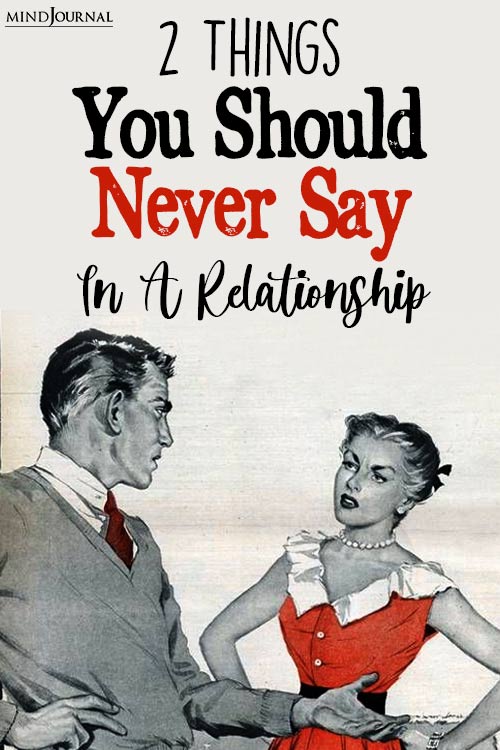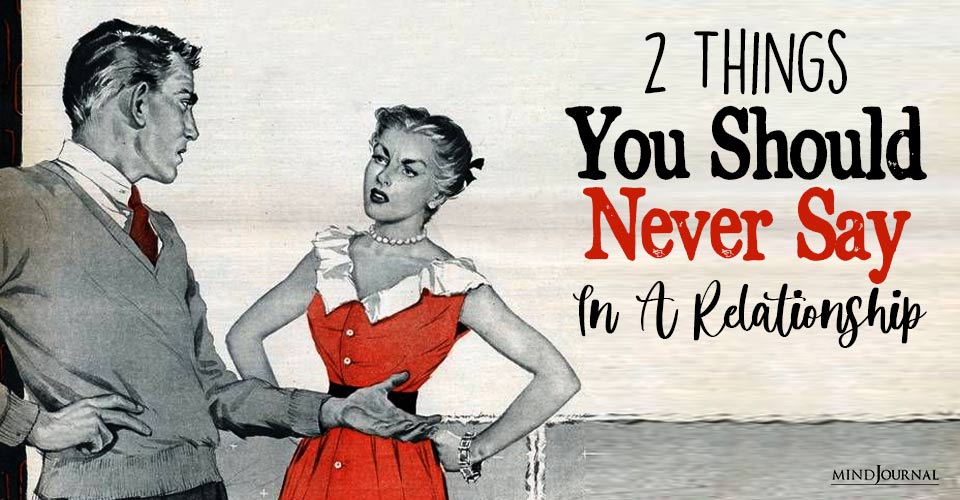If you’re dating, there are certain things you should never say in a relationship. Understand what they are so that you avoid conflicts and disagreements.
The reasons why conflicts arise in a relationship are numerous and varied. And while some of these reasons are more difficult to remedy than others …ALL of them can be remedied (if you know the root cause of that particular problem). This is why relationship counseling’s core aim mostly revolves around trying to find out the root cause of conflicts ….and then fix those root causes.
But uncovering the root causes of the problem that is driving conflict and arguments in a relationship is only solving half the problem. The other half of the problem is solved by properly communicating with your partner in response to knowing the root causes of the problem. And this is why the particular WORDS you use when in conversation with your partner are so critical.
Related: 9 Ways to Fix Your Broken Marriage
What type of words to never use with my partner?
More so than the kind of words you should use with your partner …is actually the kind of words you should NOT use. There are two words in particular you should not use as they have a tendency to unnecessarily escalate a disagreement in a relationship into a full blown conflict. These words are:

2 Things You Should Never Say In A Relationship
1. “Always”
The word “always” has a tendency to evoke a defensive response (at best) and a retaliatory response (at worst) when used during a disagreement. Neither of these responses are conducive to a healthy relationship. So why does the word “always” cause such a response? The reality is no matter what accusation you throw at your partner, it is unlikely that it is ALWAYS true. For example; the statement “You always bring the car home empty on gas” might seem as though it is a true statement to you …but to your partner they will know that this statement is not ALWAYS true.
Consequently, your partner will feel obliged to argue back and point out a situation when they brought it home full of gas or a situation where you yourself brought it home half-empty on gas. By using the word “always”, you’ve invited a defensive (or even retaliatory) response back on yourself and created an unnecessary argument for yourself. Very often the point you were trying to bring up with your partner gets lost because they will be able to demonstrate at least one instance in which your statement (whatever statement you make) is not ALWAYS true.
2. “Never”
This word works much like “always”. All it achieves is inviting an argument and adds fuel to the fire. It might seem like your partner “never” takes you out anywhere nice, but by using the word “never” you are inviting your partner to respond with a few instances (in their defense) of when they did take you somewhere nice in order to point out that your statement was false.
Your argument was really that they don’t take you out often, but by phrasing it with the word “never” a needless argument has begun. There are clearer ways of bringing up a genuine problem you have in your relationship with your partner – just be smart in the way you phrase it.
With either of the above two words, all you do is set up a straw-man argument …which your partner will feel obliged to defend themselves against because in their own mind they will feel it is incorrect that they “always” do this or that and “never” do the other thing. Creating an argument and giving your partner an invitation to retaliate is never a good idea in a relationship and ultimately gets you nowhere …but only deeper in the mud.
Related: Why You’re The Real Problem In Your Relationship, Not Your Partner
If you want to learn more about the things to never say in a relationship or how to resolve conflicts with your partner, watch this interesting video:
Did you notice something about this relationship tip?
In this article, I haven’t told you what words to use in a conflict with your partner (as if those words were some kind of magic formula) that will fix everything. But rather, I told you what words NOT to use.
This is critical.
A lot of building a happy and contented relationship is not so much the things you do or say …but rather avoiding the exact things you should NOT do or say. This is how you avoid a build-up of contempt in relationships. Happy couples are often simply smart couples in that they are clever enough to avoid doing or saying things they know would hurt their partner or unnecessarily annoy them.
Yours Appreciatively,
John Alex Clark – Coach & NLP Practitioner
For more information on relationship advice, check out John Alex Clarks website “RelationshipPsychology.com”.













Leave a Reply
You must be logged in to post a comment.